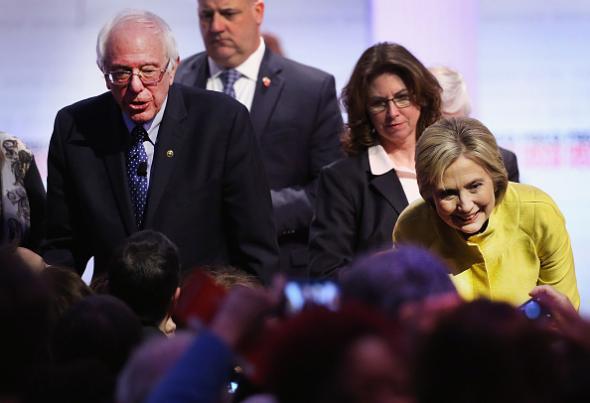Probably the most common analysis of the Democratic presidential primary is that Bernie Sanders is an ambitious dreamer while Hillary Clinton is a practical realist who may as well have the word PRAGMATISM tattooed on her knuckles. If elected, Clinton’s plan is to “grind out victories of compromise in Congress,” Vox’s Ezra Klein writes in a piece called “Hillary Clinton and the Audacity of Political Realism.” By contrast, says New York’s Jonathan Chait, “in place of any practical road map to enacting his ideas, Sanders substitutes the ‘political revolution,’ an event he invokes constantly that will sweep aside all impediments.” (While Chait’s statement implies that he thinks Clinton is a superior candidate, Sanders supporters themselves don’t necessarily see Sanders’ ambition or rhetoric about “political revolution” as a bad thing.)
The primary issue that has been most often framed in terms of the fantasy/practicality divide is health care, specifically the matter of universal coverage. The Affordable Care Act has significantly reduced the number of Americans who don’t have health insurance, but about 11 percent of the population remains uninsured. Sanders advocates for a single-payer health-care system that covers all citizens, saying it is more or less a moral necessity. Clinton says Sanders’ plan is unrealistic and that universal coverage should be achieved incrementally. Here’s Clinton herself on that subject in last night’s debate:
I can only say that we both share the goal of universal health care coverage. … [In the early ‘90s] I took on the drug companies and insurance companies to try to get us universal health care coverage. And while I am a staunch supporter of President Obama’s principal accomplishment, namely the Affordable Care Act, I know how hard it was to get that done. We are at 90 percent coverage. We have to get the remaining 10 percent.
Listening to this, or reading health care policy expert Jonathan Cohn write in the Huffington Post that “Clinton wants to build on the existing system” to achieve “universal health care,” one might presume that Clinton has proposed some sort of non-single-payer plan for expanding coverage, for getting that “remaining 10 percent.” I myself assumed that, given Clinton’s vaunted command of practical detail and real-world strategy, she must have released some detailed policy plan on the subject—a practical road map. It frustrated me that she never talked about what that plan was, but I was sure it existed.
It does not. On Clinton’s campaign website, for instance, there is a discussion of the need to “expand affordable coverage” and “make progress toward universal coverage” in general terms, but no proposal on the means for doing so. There is no plan. There is no practical road map. I asked the Clinton campaign about this, and they directed to me to several progressive proposals she’s made that are in fact quite specific about how she would reduce costs for people who already have insurance. But if you can tell me how President Clinton would provide coverage to the 11 percent of Americans who don’t have it right now, I’ll send you one American dollar (and update this article).
There are logical political reasons why this might be the case. Clinton has already apparently convinced most people that she’s the practical candidate, so why expose herself to criticism that her own plan is unrealistic? Listing specific promises or goals related to universal coverage, as Slate’s Jamelle Bouie noted this morning in regards to the “public option,” would just create ammunition that could be used against her when/if she’s elected and the Republican Congress refuses to pass anything that expands the ACA. (Think about Obama’s promise to close Guantánamo, which he’s still taking heat for even though the issue is largely out of his control.)
The Republican Congress won’t, of course, pass a universal coverage bill under either Hillary Clinton or Bernie Sanders without some sort of major paradigm shift in United States politics. Still. If you’re the practical and realistic candidate, and the practical and realistic truth is that universal health coverage will not be achieved in the next four years, how is it any less of a fantasy to say, in vague terms, that you will make progress toward it incrementally? “It is difficult to, in any way, argue with the goal that we both share,” Clinton said last night about universal coverage. Then she challenged Sanders to defend his single payer dream. “I think the American people deserve to know specifically how this would work,” she said. Amen!
